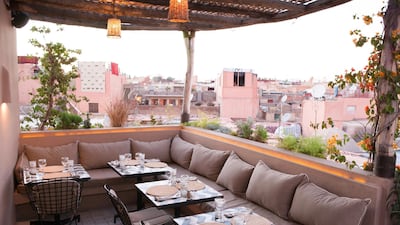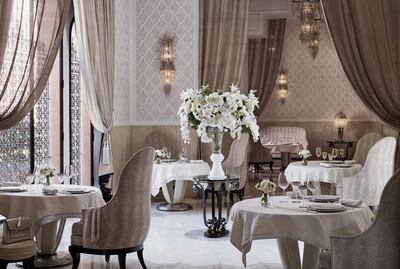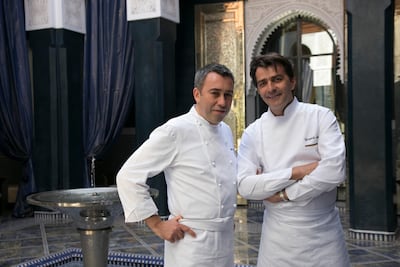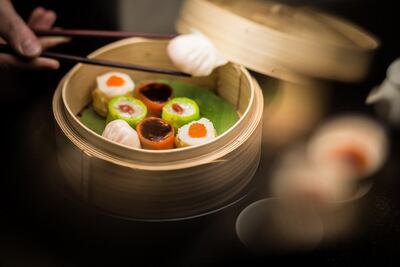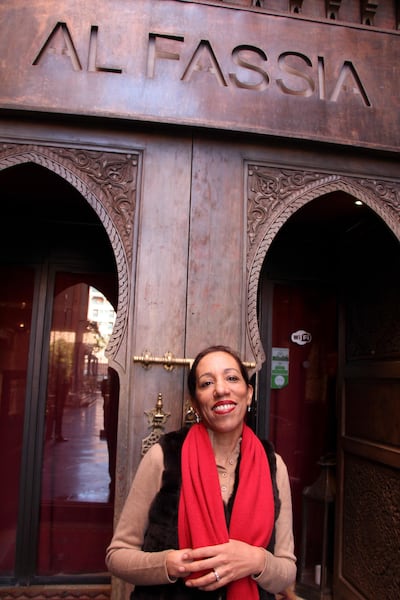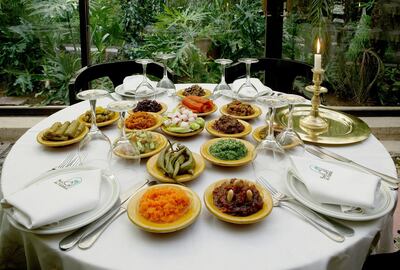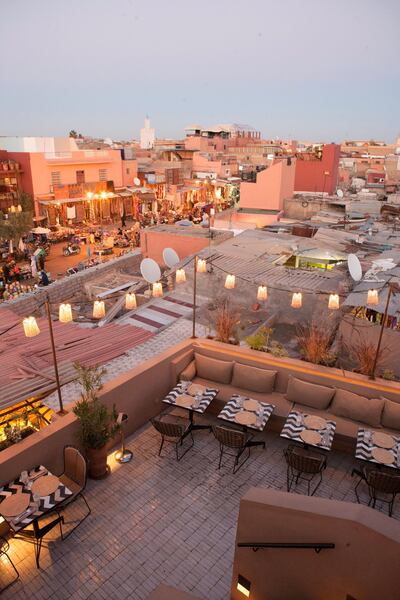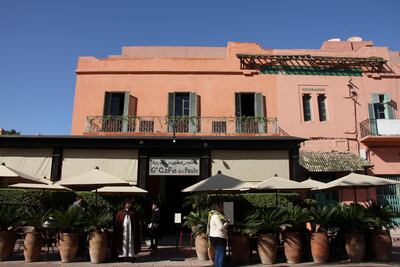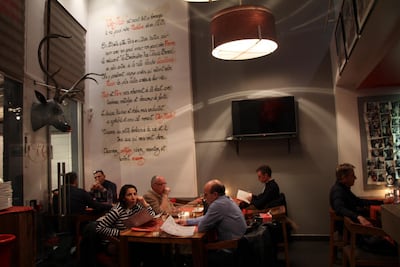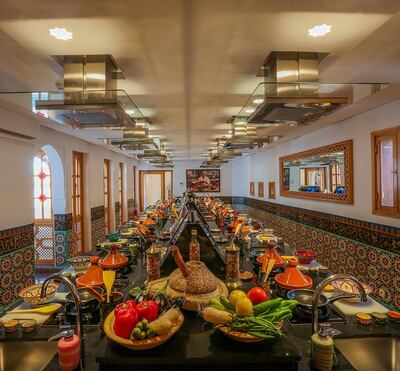As the sun slowly sets over Marrakech, like most visitors, I am magnetically drawn to the bewitching spectacle acted out every night in the ancient Medina’s immense Jemaa El Fna square. Crowds form circles around bands of musicians, dancers, snake charmers and storytellers, while all around, waiters and cooks of 100 food stalls almost as miraculously set up makeshift kitchens billowing smoke, with tables, chairs and serving counters groaning with delicious street dishes.
But this is just the tip of Marrakech's vibrant dining-out scene, where sophisticated restaurants prepare local dishes such as tagine and couscous to a gourmet level, and young local chefs, inspired by the likes of London-based Palestinian Sami Tamimi, daringly reinterpret both Moroccan and French cooking. Renowned French chef Yannick Alléno, who has helmed more than one restaurant with three Michelin stars, tells me of the haute-cuisine restaurant he oversees here in the sumptuous Royal Mansour hotel, and whets my appetite with enthusiastic descriptions of locally sourced produce: black truffles, plump oysters, lobster, fragrant saffron, quince and juicy oranges.
After 10 minutes' walk, the frenzy of Jemaa El Fna is forgotten, as I pass through the towering gates of the Royal Mansour, more a palace than an hotel, and enter the elegant dining room of La Grande Table Française (tasting menu 1,500 Moroccan dirhams [Dh601]).
La Grande Table is quite simply the ultimate fine-dining experience in Marrakech, from starched table cloths and crystal glasses to impeccable waiters hovering around each table. But the star of the show is Alléno’s inspired modern cuisine, perfectly executed by his longtime collaborator, chef Jérôme Videau, who has run the kitchens here since the hotel’s opening and admits to being fascinated by Moroccan cuisine. The tasting menu features a to-die-for blue lobster and scallop souffle, as well as a “terre et mer” roasted turbot with bone marrow resting on a bed of grilled artichokes, but nothing prepares me for the intense flavours of stuffed endive with quince, cacao and black truffle shavings, cooked and theatrically served in the cacao pod. “The great majority of the produce you are tasting is local, farm-to-table, and wonderful to work with,” Videau says. “I have been inspired here by both the vibrant street food scene and experiencing authentic home-cooking, and our goal is not just to please the guests, but to form a new generation of Moroccan chefs. I want them to learn from us, from Yannick Alléno’s inspirational recipes, but also to appreciate the genuine history and heritage of their own cuisine.”
Every luxury hotel in Marrakech boasts a gastronomic restaurant, from Fouquet's at The Naoura to Quattro's Italian dishes at the Four Seasons, but for originality, my most interesting experience was at the imposing Mandarin Oriental, whose hip Ling Ling (mains from 390 Moroccan dirhams [Dh156]) showcases the cuisine of Hong Kong's fashionable Michelin-starred Hakkasan. Ling Ling's chef, Su Kian Lau, who came here from Hakkasan Dubai, works together with Samir El-Layfi, Morocco's Bartender of the Year to create an "izakaya" experience where cocktails and mocktails take centre stage, paired with signature Cantonese dishes flavoured with subtle Moroccan influences. To accompany my Dragon Love mocktail – strawberries, ginger, vanilla, chilli and mango – Lau prepares a perfect crispy duck with sour plum sauce.
Before leaving the privileged world of these palace hotels, friends who live here say I shouldn't miss La Mamounia's famed poolside brunch, where le tout Marrakech gathers on Sunday lunchtime. One of the world's mythical hotels, La Mamounia (Sunday brunch 1,200 Moroccan dirhams [Dh481]) was frequented by the likes of Josephine Baker, Winston Churchill, Charlton Heston and Orson Welles. Today, the al fresco Sunday brunch is still the place to be seen. I have never witnessed quite such an epic feast laid out for lunch – plump crayfish and lobster, salmon and tuna tartare, baked lamb, roast beef, oysters and sweetbreads – with the waiters, who joke with fashionably-dressed regulars, encouraging everyone to go back for more. A memorable meal, although far from a detox brunch.
To find out more about Moroccan cuisine, every chef I meet, without exception, insists I reserve at Al Fassia (Moroccan salads 95 Moroccan dirhams [Dh38]), a bastion of traditional cooking whose kitchens have been ruled over by women for more than 30 years. In the same neighbourhood as the new Yves Saint Laurent Museum, I sit down in this intimate dining salon opposite Saida Chab, one of the two sisters who own it. "From day one when my parents opened Al Fassia," she recalls, "we have stayed true to our aims: to present the classic dishes of home-cooked Moroccan cuisine, prepared and presented at the highest level. That is why our menu hardly ever changes, never follows fads or trends. Our loyal clientele, both tourists and local residents, keep returning here for that."
While Al Fassia proposes a wonderful selection of tagines and couscous, the unique “sucre-sale” tastes of a pigeon pastilla, wrapped in wafer-thin filo pastry, and the signature confit shoulder of lamb, is the standout dish for me, at the start of the meal. Chab calls it “our homage to the what everyone calls simply Moroccan salad”. This hardly prepares me for a tray of 15 tiny terracotta plates, each filled with a spicy vegetable salad; cucumber perfumed with thyme and orange blossom, cumin-spiced carrots, marinated courgettes, broad beans powdered with ras el hanout, sweet potatoes, crunchy sucrine lettuce and radish, and everyone’s favourite, “maassla” sticky caramelised tomatoes.
If Al Fassia represents traditional Moroccan cooking, then the future lies hidden away in the medieval souqs of the Medina. My guide is bohemian restaurateur Kamal Latifi, whose three innovative diners have earned him the title of Foodie King of the Medina. Almost everyone visiting Marrakech ends up once in his funky Cafe des Epices, opened 10 years ago. "At the time," he explains, "eating out in the Medina meant squatting at a street stall. So we gave people comfort, tasty food, music, Wi-Fi and proper toilets. It sounds obvious now, but back then it was revolutionary."
More refined cuisine follows at Le Jardin, a romantic hidden garden restaurant, and now there is Nomad (mains 120 Moroccan dirhams [Dh48]), where Latifi admits to searching for a lighter take on traditional dishes – "grandma's cooking with a modern touch, playful, less spicy, more vegetarian".
At Nomad, the vegetable pastilla uses less sugar, a pastry brik is filled with aged beef, turnip puree and green harissa, while calamari fished in Agadir is braised in a cumin-infused anchovy sauce with fennel. Despite gourmet food, Nomad remains a relaxed locale, prices are affordable and the view across Marrakech from the roof terrace is stupendous.
My final day is spent exploring a lively but untouristy part of the city that few visitors discover, Gueliz, formerly the French colonial quarter, which is favourite hangout of Marrakech's significant expatriate community. The sumptuous Grand Cafe de la Poste (salade Niçoise 150 Moroccan dirhams [Dh60]), unchanged since it opened in 1917, could have been the inspiration for Rick's Cafe in the movie Casablanca. Packed from morning until night, it is perfect for coffee and croissants at breakfast, an old-fashioned salade Niçoise for lunch, and a generous plate of foie gras in the evening.
Just along the road is another time warp diner, Chez Mado (Rue Moulay Ali; raw seafood platter 250 Moroccan dirhams [Dh100]). You could be walking into a typical bustling 1950s Parisian brasserie as waiters weave between tables precariously balancing enormous raw seafood platters. The difference here is that owner-chef Alain Chaussetier sources all his fish and seafood from Morocco.
And it is Chaussetier who tips me off that Marrakech also has a booming cooking-school scene, advising me to book at La Maison Arabe (one-hour cooking course 300 Moroccan dirhams [Dh120]), a luxury riad owned by Italian Fabrizio Ruspoli. "I was the first to open a cooking school," Fabrizio tells me, "because I found my guests were intrigued by what went on inside a Moroccan kitchen and that during a classic three-day trip to Marrakech, there was a moment that they wanted more than shopping and sightseeing, so I invented the One Hour One Dish Cooking Course." Fatima, our teacher-chef, couldn't be more efficient, explaining her cooking secrets to our attentive group, and for once, I end my trip with the souvenir not just of memorable meals, but also how to prepare an authentic tagine at home.
__________________
Read more:
Mountains to medina: the enduring appeal of Morocco
24 hours in Casablanca, Morocco
Hotel Insider: Amanjena, Marrakech, Morocco
__________________
